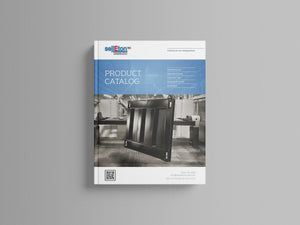
Top RFID Scales for Accurate and Efficient Inventory Management
RFID scales use radio frequency identification to automatically track items and provide real-time inventory data. This article explains how RFID scales work and the benefits they offer for efficient inventory management.
Key Takeaways
-
RFID scales improve inventory management by providing real-time data, reducing human error, and increasing efficiency through automated processes.
-
The integration of RFID technology with Warehouse Management Systems enhances operational visibility and accuracy, allowing businesses to manage large inventories effectively.
-
Choosing the right RFID scale involves assessing weight capacities, environmental conditions, and ensuring compatibility with existing systems for optimal performance.
Understanding RFID Scales
RFID, or radio frequency identification, is a technology that uses electromagnetic fields to automatically identify and track tags attached to objects. RFID weighing scales harness this technology to detect and track items in inventory without the need for manual input. This system is composed of RFID tags, an rfid reader, and specialized software, which work together as a device to enable real-time inventory management, significantly reducing errors and saving valuable time.
A standout feature of RFID technology is its ability to scan without a direct line of sight. Unlike traditional barcode systems, RFID readers can detect tags even when they are not visible, making the process more efficient and less time-consuming. This capability is particularly beneficial in busy warehouse environments where speed and accuracy are critical.
Real-time data provided by RFID scales allows businesses to continually monitor stock levels and respond swiftly to supply chain demands. This constant flow of information ensures that inventory records are always up-to-date, providing a solid foundation for effective inventory management, production, plc, and decision-making in the store.
Benefits of RFID-Enabled Weighing Scales
The integration of radio frequency identification technology into weighing scales brings a plethora of benefits. One of the most significant advantages is the improvement in data accuracy. RFID systems eliminate the risk of human error, providing precise and reliable weight data that can be updated in real-time. This accuracy is crucial for maintaining the integrity of inventory records and ensuring that all assets are accounted for correctly.
RFID weighing scales also enhance operational speed and efficiency. For example, a vehicle can be weighed without requiring drivers to exit their vehicles, significantly reducing queue times and streamlining the weighing process. This automation leads to substantial labor savings, as processes that traditionally required manual input are now handled automatically.
Security is another critical benefit of RFID technology. Only authorized vehicles equipped with RFID tags can access weighing systems, mitigating the risks of theft or fraud. Additionally, RFID systems provide visibility into asset conditions, allowing for timely maintenance and optimized resource management. This comprehensive approach ensures that businesses can operate smoothly and efficiently, ultimately leading to cost savings and improved productivity.
How RFID Scales Improve Inventory Count Accuracy
One of the standout features of RFID technology is its ability to capture data in real time, which significantly enhances the accuracy and integrity of weight records. Benefits include:
-
Continuous updates on stock levels and asset movements from RFID scales streamline inventory management processes.
-
Real-time visibility allows warehouses to make immediate adjustments.
-
Accurate tracking of inventory.
RFID technology simplifies the tracking of goods moving in and out of the warehouse. Strategically placed RFID readers can detect inventory movements instantly, ensuring that the Warehouse Management System (WMS) is updated automatically. This integration eliminates the need for manual data entry, reducing the likelihood of errors and ensuring that inventory records are always accurate.
The high accuracy of RFID systems makes them ideal for counting and tracking inventory. Whether it’s tracking the quantity of items or logging their movements, RFID scales provide a reliable solution for maintaining accurate inventory counts. This accuracy is essential for businesses that need to manage large volumes of stock efficiently and effectively.
Integration with Warehouse Management Systems
Integrating RFID scales with Warehouse Management Systems (WMS) is paramount for achieving a seamless and efficient inventory tracking process. This integration facilitates live reporting and monitoring, enhancing overall operational visibility and performance. Automating the identification and logging processes with RFID technology minimizes manual data entry and errors, resulting in a more reliable inventory management system.
RFID technology allows for real-time tracking of inventory, significantly improving accuracy and visibility throughout the supply chain. This capability is particularly beneficial for businesses that need to manage large volumes of inventory across multiple locations. The benefits include:
-
The ability to read and count thousands of RFID tags simultaneously
-
Enhanced efficiency in inventory management
-
Ensuring that inventory records are always up-to-date
Compatibility with existing inventory management systems is crucial for a smooth integration process. RFID scales can be easily integrated with most WMS platforms, streamlining operations and ensuring that businesses can leverage the full potential of RFID technology. This compatibility ensures that businesses can adopt RFID scales without extensive modifications to their existing systems.
Applications in Various Industries
RFID scales offer versatile solutions that can be tailored to fit various inventory types, ensuring accurate tracking across different categories. In the logistics industry, for example, RFID scales streamline inventory processes by providing real-time data on product weights and locations, thereby improving operational efficiency. This real-time tracking is invaluable for managing complex supply chains and ensuring that products are delivered on time.
Retailers also benefit significantly from RFID technology. Enhancing inventory accuracy with RFID scales helps retailers manage their stock more effectively, reducing the risks of stockouts or overstocking. This improved accuracy ensures that customers can always find the products they need, enhancing overall satisfaction and encouraging repeat purchases.
The pharmaceutical industry is another field where RFID scales play a critical role. Tracking temperature-sensitive medications with RFID scales ensures these products remain within safe limits during storage and transport, maintaining their efficacy and safety. Across various industries, the practical applications of RFID scales are transforming inventory management and driving operational improvements.
Choosing the Right RFID Scale for Your Business
Selecting the right RFID scale for your business begins with considering the following factors:
-
Weight capacity to ensure it meets your specific application demands.
-
Environmental conditions where the scale will be used, such as temperature and humidity.
-
Resistance to harsh conditions, like moisture or extreme temperatures, for durability and longevity.
Conducting a site survey is a critical step in the selection process. Evaluating environmental factors and operational workflow helps businesses identify the best applications for the technology and ensure optimal performance. The size and design of the RFID scale should align with the physical facility space and workflow of your business to ensure seamless integration in your search for efficiency.
Consulting experts like Selleton Scales can provide valuable insights and recommendations tailored to your specific needs. A thorough assessment of operational requirements will help in choosing an RFID scale that enhances efficiency and meets the unique demands of your business.
Installation and Maintenance of RFID Scales
Proper installation and maintenance are crucial for the optimal performance of important RFID scales. Ensuring that the scales are correctly positioned and considering environmental factors during installation can minimize potential issues and enhance performance. Regular calibration and software updates are essential to maintain the accuracy and reliability of the RFID scales.
Routine cleaning and maintenance checks can prevent unnecessary downtime and extend the lifespan of the scales. Businesses should establish a maintenance schedule to conduct these checks regularly, ensuring that the RFID scales remain in good working condition. Proper maintenance not only enhances the performance of the scales but also ensures that the investment in RFID technology continues to deliver long-term benefits.
Enhancing Customer Satisfaction with RFID Scales
RFID technology plays a significant role in enhancing customer satisfaction by improving order fulfillment and inventory visibility. Real-time inventory data enables retailers to fill online orders efficiently and optimize fulfillment, leading to quicker deliveries and higher satisfaction. This seamless integration ensures that customers receive their orders promptly and accurately.
In click-and-collect services, RFID technology offers several advantages:
-
Reduces wait times by speeding up the process of locating and preparing orders for pickup.
-
Provides accurate inventory information, enabling staff to offer better assistance to customers, enhancing loyalty and encouraging repeat business.
-
Facilitates a more efficient returns process by quickly identifying products, thus improving customer satisfaction during returns.
In the pharmaceutical sector, RFID scales ensure the safe storage and transport of temperature-sensitive medications, maintaining their efficacy and safety. This traceability enhances customer trust and satisfaction, as they can be confident in the quality and safety of their medications.
Cost-Benefit Analysis of RFID Scales
Implementing RFID scales involves a comprehensive cost analysis, including:
-
Expenses related to hardware
-
Software integration
-
Training
-
IT infrastructure upgrades
While the initial investment can be substantial, the long-term operational benefits often justify the costs. RFID technology can significantly reduce labor costs and operational errors, leading to long-term financial savings for businesses.
Ongoing maintenance and upgrades of RFID systems incur additional costs, which should be planned for to avoid unexpected financial burdens. However, the automation of operations through RFID reduces the need for staff involvement, leading to labor cost savings and improved productivity.
Businesses should conduct a thorough cost-benefit analysis to assess the financial impact of implementing RFID scales. By evaluating the long-term benefits and potential savings, businesses can make informed decisions about investing in this technology.
Common Challenges and Solutions
Implementing RFID technology can present several challenges, but effective solutions are available to address these issues:
-
Interference from devices like Wi-Fi can disrupt communication between RFID tags and readers, necessitating careful system deployment planning.
-
Optimizing tag placement can improve the read range and performance of RFID systems.
-
Using high-quality tags also enhances the effectiveness of RFID systems.
By addressing these points, businesses can improve the performance of their RFID implementations.
Compatibility issues between different brands of RFID tags and reader can be mitigated by adhering to the same RFID standards. This combination of standardization ensures that all components work together seamlessly, reducing the risk of errors and improving overall system performance as needed.
Data collisions in RFID systems can also be managed through anti-collision protocols, ensuring accurate tag reading even in high-density environments, which is crucial for the operator to set a complete connection and added control type number designed transferred by computer.
RFID technology helps identify discrepancies between physical stock and recorded data, enabling prompt corrective actions. By addressing these challenges, businesses can fully leverage the benefits of RFID scales and enhance their inventory management processes.
Summary
In summary, RFID-enabled weighing scales represent a significant advancement in inventory management technology. By providing real-time data updates, improving accuracy, and streamlining operations, these systems offer numerous benefits for businesses across various industries. The integration with warehouse management systems further enhances operational efficiency, while the versatility of RFID scales allows for tailored solutions to meet specific needs.
Choosing the right RFID scale involves considering weight capacity, environmental conditions, and conducting site surveys to ensure optimal performance. Proper installation and maintenance are crucial for the longevity and reliability of these systems. Additionally, RFID technology plays a vital role in enhancing customer satisfaction by improving order fulfillment and inventory visibility.
Ultimately, the cost-benefit analysis of RFID scales shows that while the initial investment may be substantial, the long-term savings and operational improvements make it a worthwhile investment. By addressing common challenges and implementing effective solutions, businesses can fully realize the potential of RFID-enabled weighing scales and transform their inventory management practices.
Frequently Asked Questions
What are the main components of an RFID system used in weighing scales?
The main components of an RFID system used in weighing scales include RFID tags, readers, and specialized software. These elements collaborate to facilitate accurate inventory management and minimize errors.
How do RFID scales improve inventory count accuracy?
RFID scales enhance inventory count accuracy by enabling real-time data capture and seamless integration with Warehouse Management Systems (WMS), leading to automatic updates and streamlined tracking of goods. This allows for more precise inventory management.
What industries can benefit from using RFID-enabled weighing scales?
RFID-enabled weighing scales can significantly benefit industries such as logistics, retail, and pharmaceuticals by improving inventory accuracy and streamlining processes. Their application ensures the safe storage and transport of sensitive products, enhancing operational efficiency.
What factors should be considered when choosing an RFID scale for a business?
When selecting an RFID scale for your business, it is essential to assess weight capacity, environmental conditions, and the scale's size and design, in addition to performing site surveys for optimal performance. These factors will ensure the scale meets your operational needs effectively.
What are the common challenges associated with RFID technology, and how can they be addressed?
The common challenges associated with RFID technology include interference from devices, read range limitations, and compatibility issues. These can be effectively addressed through strategic system deployment, optimizing tag placement, adherence to industry standards, and the implementation of anti-collision protocols.

